In this module, we are going to explore…
Keyword Research.
Keyword research is an important part of any successful website’s SEO strategy.
If performed correctly your site will attract thousands of relevant visitors every month that convert into leads, sales and profit.
Get this wrong thought and you might just attract a ton of freebie seekers that deliver no value to you as a business.
So with that in mind, let me show you how keywords work, why they are important and how they all mesh together to support a wider SEO strategy aligned to your business goals.
What Are Keywords?
Search engines exist to help you find the most relevant website that matches your query.
And to do this you enter in a series of words which relate to that query:

These words are more commonly known as ‘keywords’.
By optimising these ‘keywords’ effectively on your site, you will be increasing the chances your pages show in the search results for your target keywords.
How Do Keywords Work?
Keywords are what connects humans, search engines and websites.

So in order for search engines to understand:
- What your page is about
- How relevant it is for the search query
You need to optimize your page to clearly communicate that.
This includes simple things like including your target keyword in title tags:
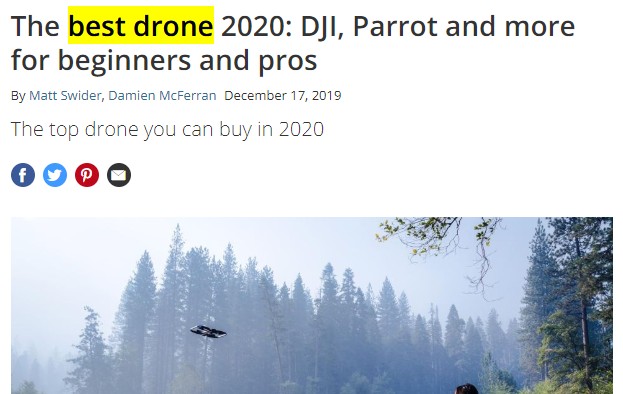
The URL:

Subheadings:
And content:
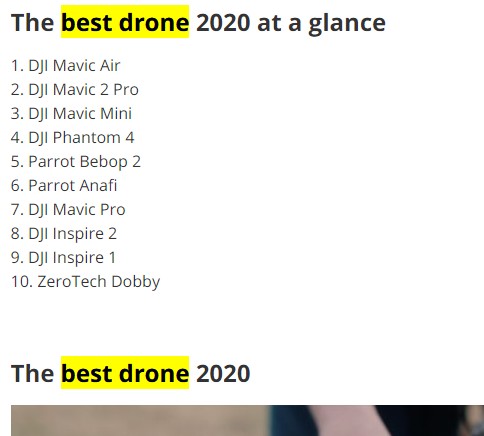
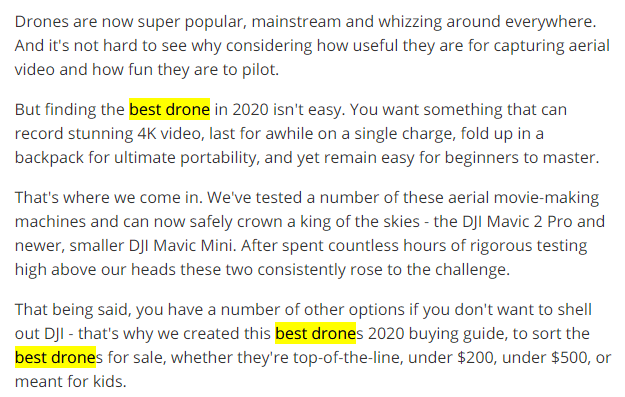
So when a search engine crawler visits your site…
They have a very clear understanding of exactly what your page is about.
Which then means someone enters a search query using your target keywords, your site is much more likely to appear in the search results.
Why Are Keywords Important?
Keywords really are the heart and soul of SEO.
Without keywords:
- Search engines couldn’t find the right content for the searcher
- A website couldnt’t communicate what their page is about
In short…
Search engines wouldn’t exist.

Every search starts with a keyword and ensuring your pages are optimised correctly for the right types of keyword is crucial.
How Keywords Signal Intent
There are usually two types of keyword intent:
- Commercial
- Informational
These are identified by the prefix or suffix added to the main keyword.
So if a keyword had words attached like-
- Buy
- Deal
- Discount
- Best
The searcher has commercial intent and is looking to buy.
But if the keyword has words attached like-
- How to
- Review
- Learn
- Why
- Is
Then the searcher is looking to learn something and some types of informational content can lead to sales.
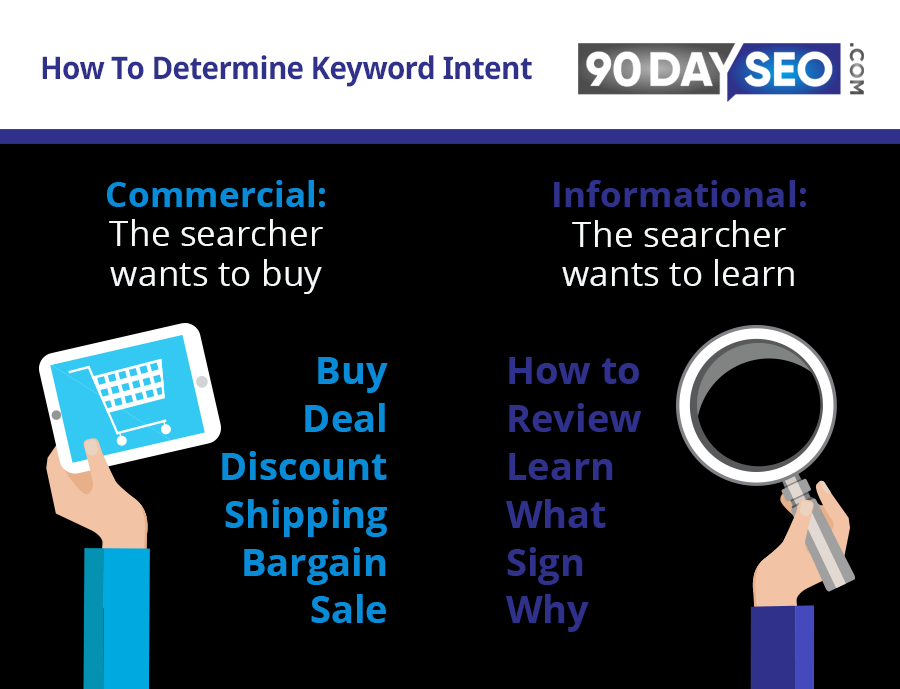
It’s important that you keep intent in mind when doing keyword research.
A lot of people get dazzled with high search volumes but you always be asking yourself, how does the intent of this keyword align with the goals of my business.
Understanding who your visitors are and what they want to achieve is vital when considering the intent and type of keywords to optimise for.
How To Determine The Value Of A Keyword
Finding the best keywords isn’t just about search volume, there are a number of things you need to consider when determining the value of a keyword.
This is an essential discipline to learn because each piece of content you create and each link you build to it has a cost, and it’s important that cost pays for itself.
So when looking at any keyword you need to ask yourself-
- Does this keyword fit my site?
- Does the intent match my business goals?
- Will the content I’m able to create be good enough to compete?
- Who else is ranking for this keyword?
- Can I compete with existing competition?
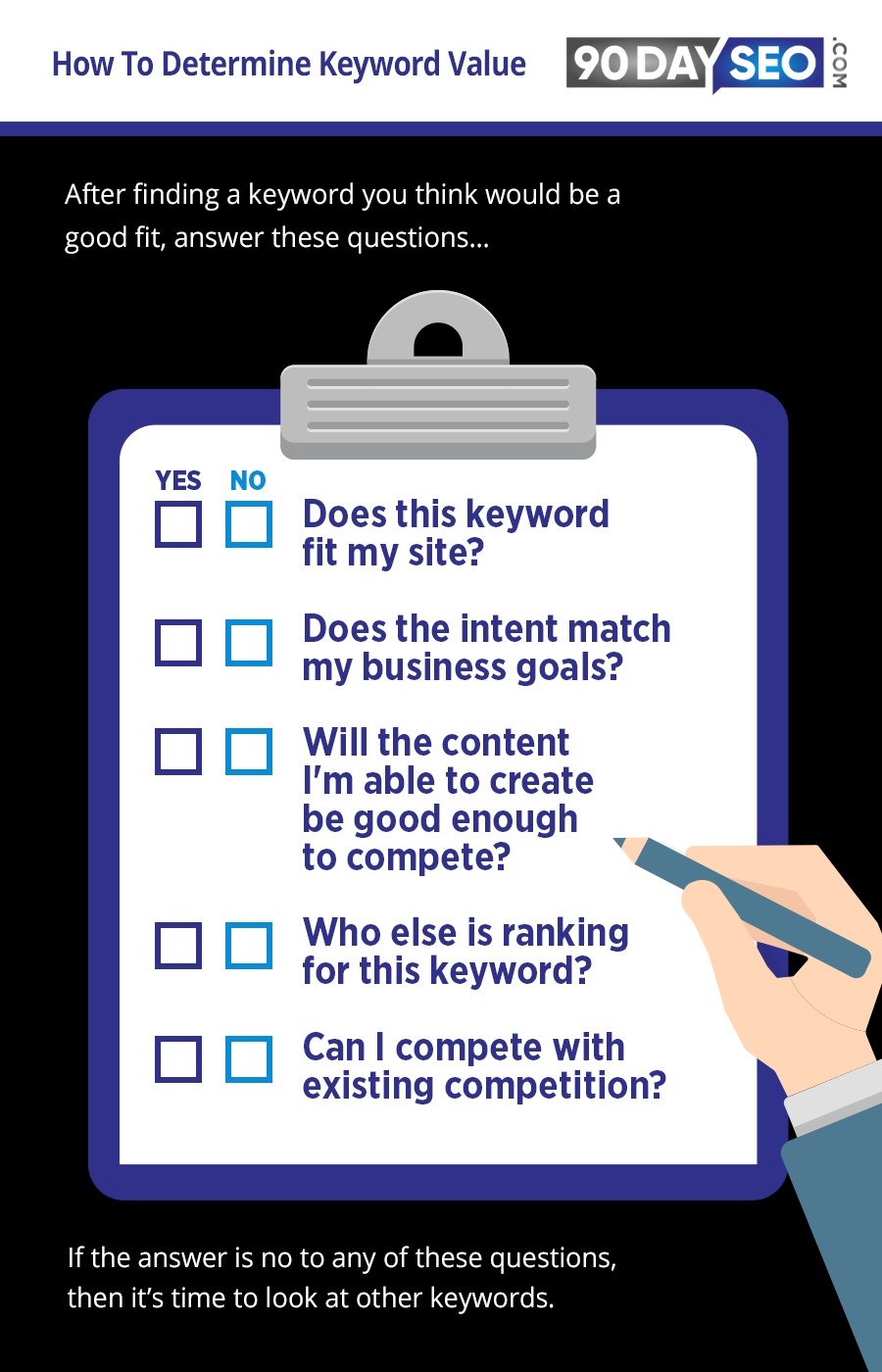
You must be able answer “Yes” to all of those questions in order to target them.
If not:
Don’t waste your resources!
The Best Types Of Keywords To Target
The type of keyword you choose to target will depend on your business goal.
But generally speaking, my favourite types of keywords to target are…
Question Based Long Tail Keywords
The clue is in the name but question based long tail keywords are keywords looking to get answers to specific questions.
They usually have a smaller number of searches but they also have-
- Much less competition
- Solid conversion rates
- And the opportunity to steal featured snippets!
Some question based long tail keyword examples are:
- Which drone is best for beginners
- How to find a lost drone
- What drones have the best battery life
Another type of keyword you can explore is…
Specific Buyer Keywords
These keywords indicate a very clear idea of what the searcher is looking for with some level of intent indicating they are looking to buy.
They often have high search volumes, convert very well and provide great streams of income.
The only downside is that they tend to attract a lot of competition and have a higher barrier of entry when it comes to content creation and link building.
Examples of exact keywords would be:
- Best camera drone
- Photography drone reviews
- Buy a racing drone
IMPORTANT: You need content that covers both types of keywords in order to compete. You’ll see why later in the program.
Tyre Kicker Keywords To Avoid
Tyre kicker keywords should really be avoided.
These are the type of keywords that attract the wrong kind of traffic that doesn’t convert or align with your business goals.
For example if you are an ecommerce store that sell’s drone, it’s a bad idea to target keywords like-
- Free drone simulator
- FAA drone registration
- Free drone footage
- Saudi drone attack
Even if they had next to no competition and high search volume, you should avoid any keyword that doesnt align to your overall business and SEO strategy.
Honestly this is such a strict discipline to learn but it can literally make or break your campaign.
Final Thoughts…
Today we have learnt what keywords are, why they are so important and how you can use them to grow (or kill) your business.
But before we can get into keyword research, we need to start with topic research.
Remember:
One of the most common SEO problems I see is sites that have gone wide with lots of keywords, but not deeply into any topics.
That is because most people are fixated on keyword research and individual search volumes, rather than looking at a topic as a whole.
Focusing on topic research comes with a number of benefits-
- It keeps visitors engaged and moving around your site
- It keeps search engine spiders engaged and moving around your site
- It creates topical relevancy and authority
- It creates multiple opportunities for link building
All of that work’s in unison to increase your search visibility, but if you are just focused on keyword research at a macro level you are leaving all of those benefits on the table.
So before looking at exactly how to research keywords…
First we are going to take a closer look at how to find the right topics for your website.